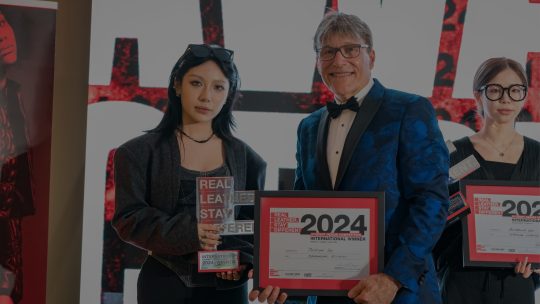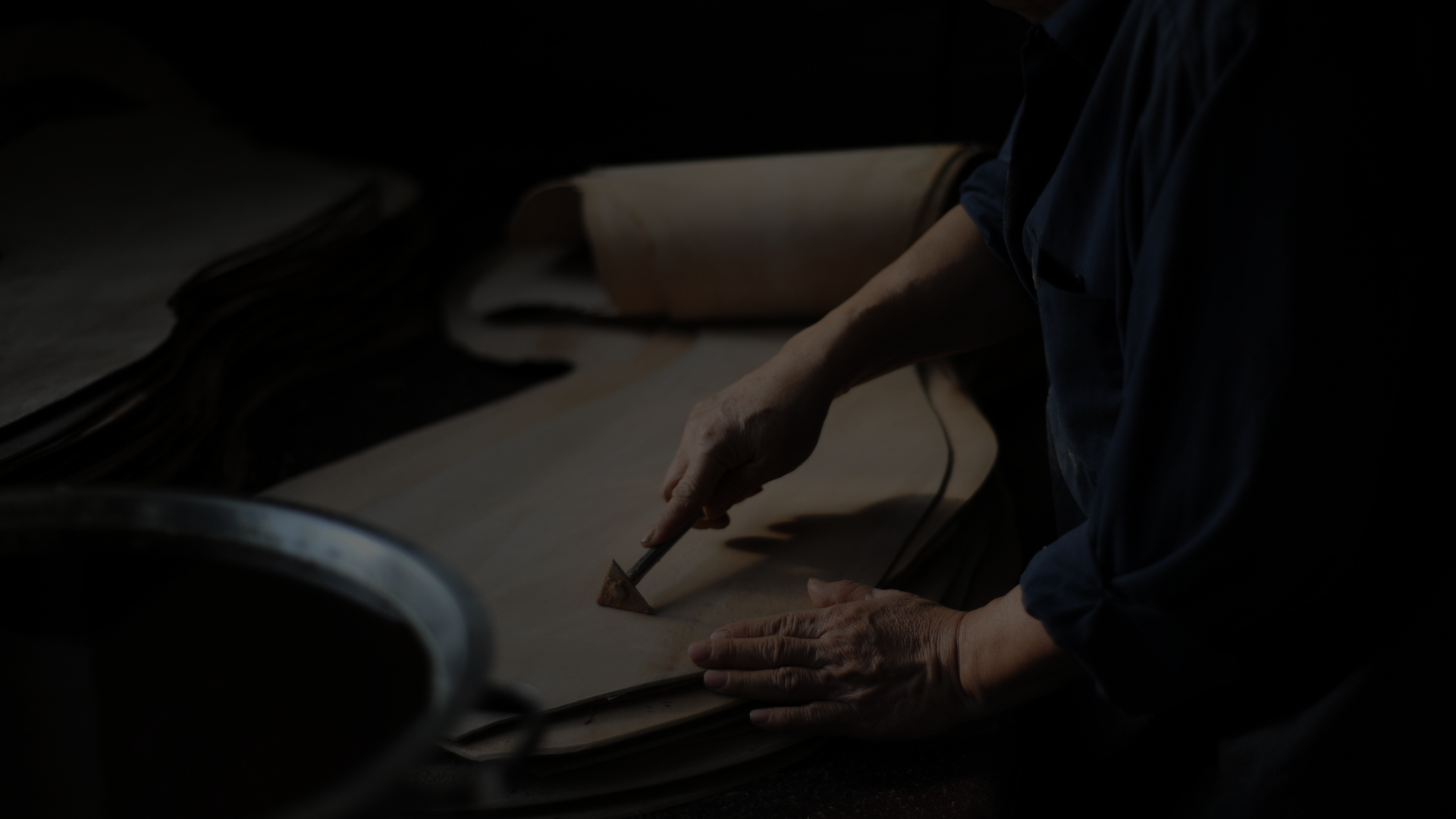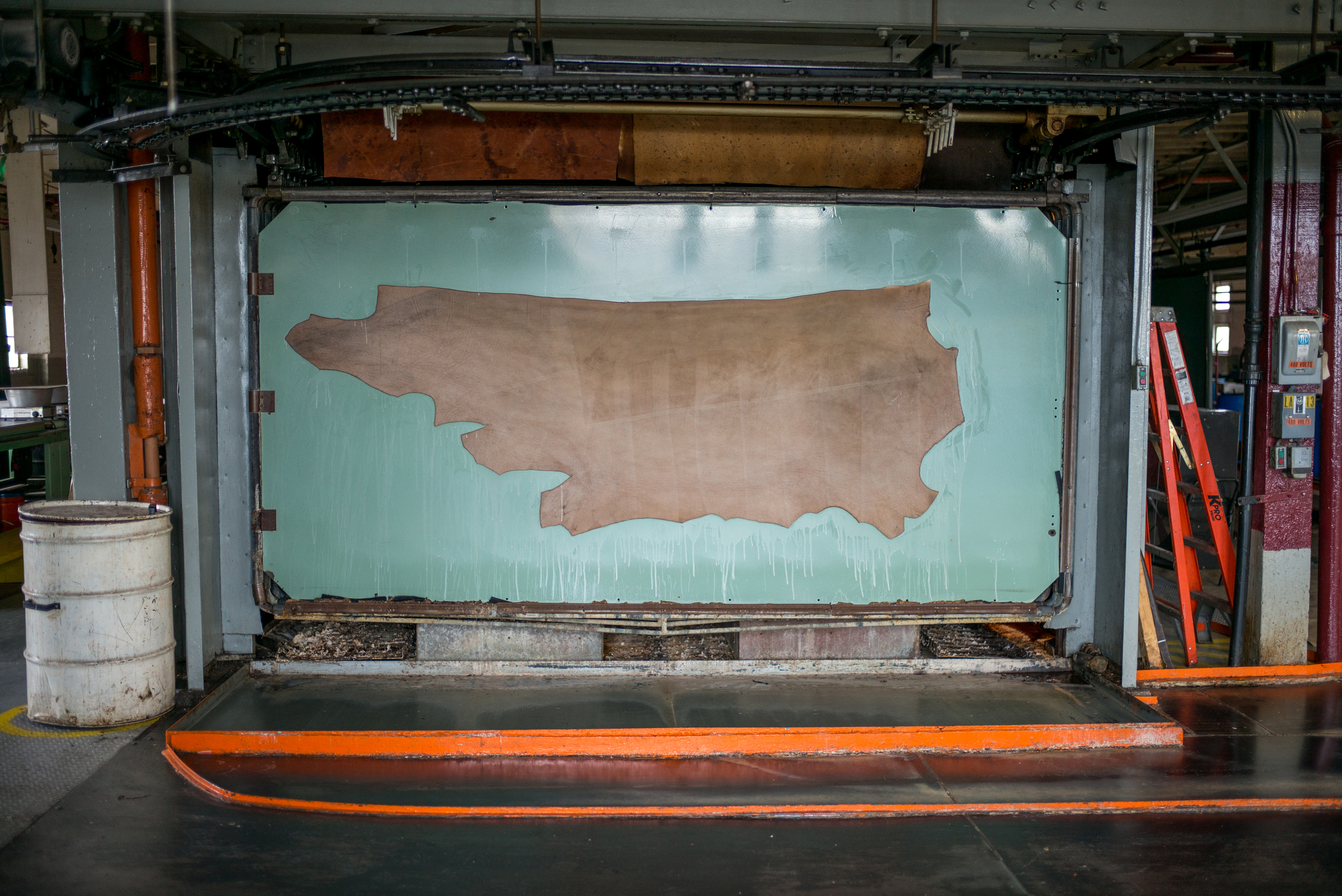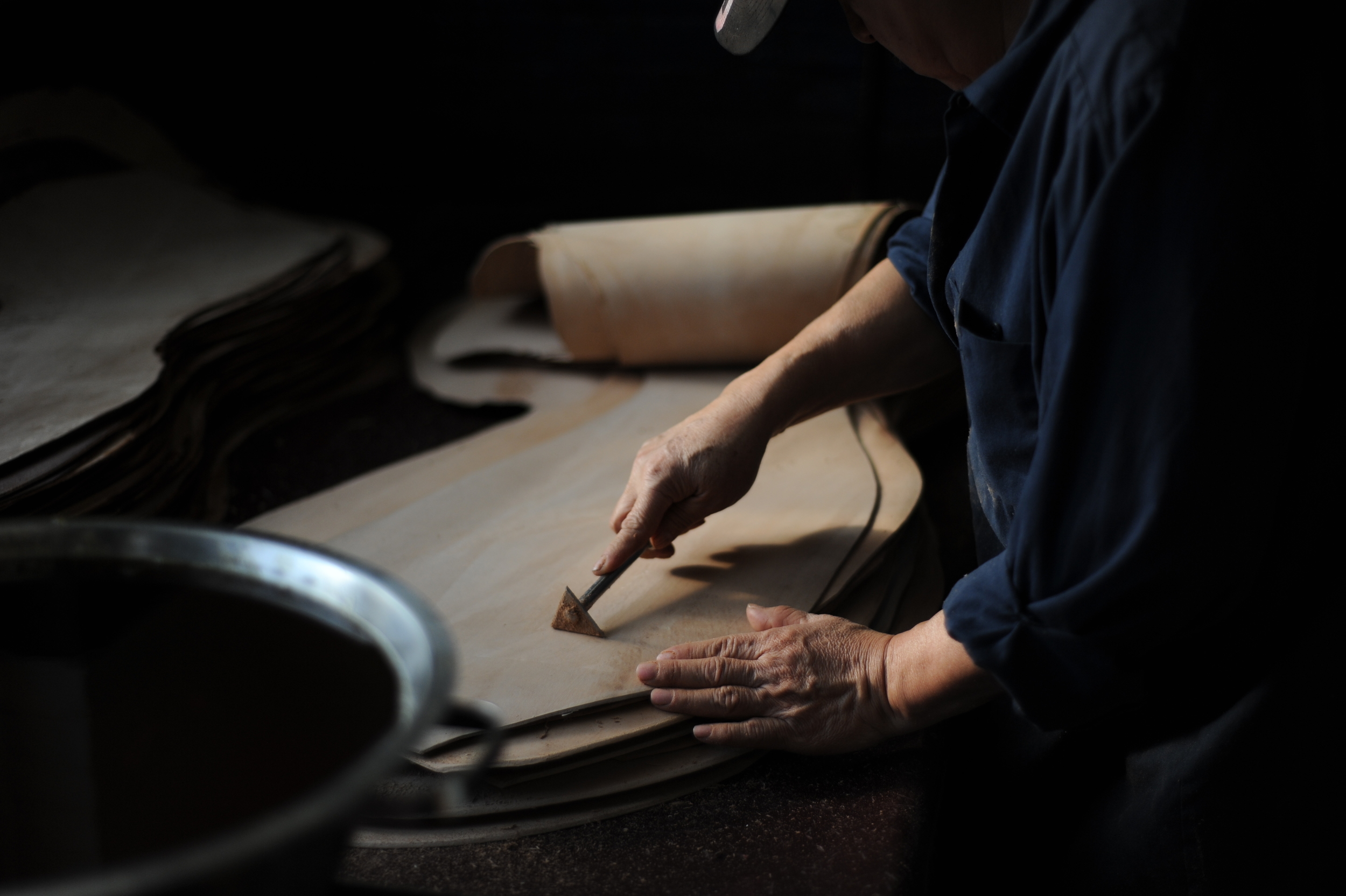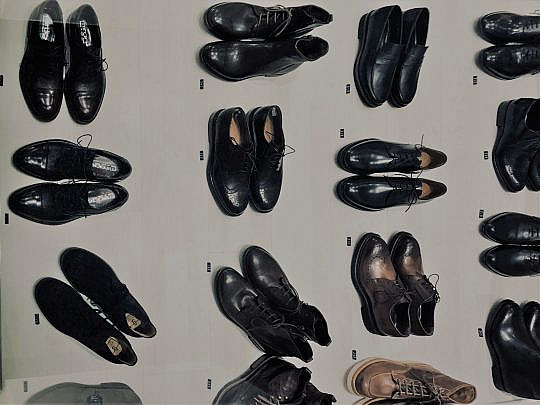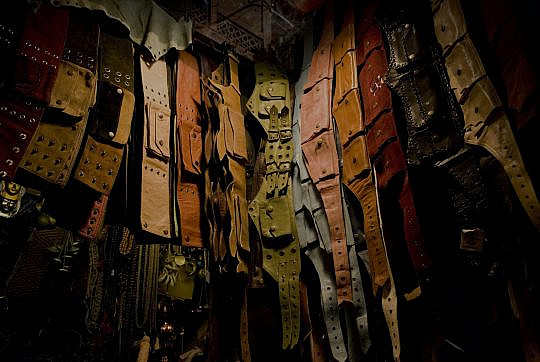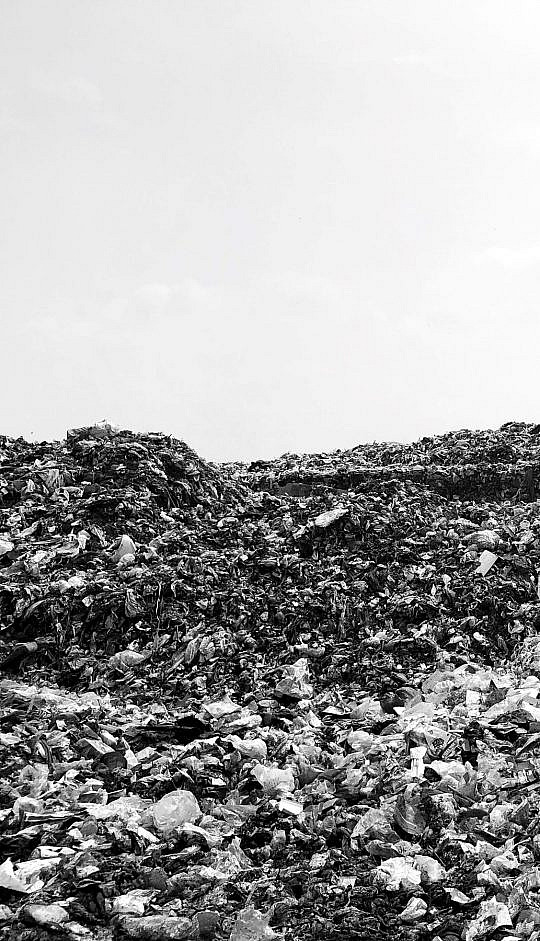Founded by Isadore Horween in 1905, Horween is one of the world’s premium leather producers. Supplying leather for everything from NFL footballs to some of the finest shoe companies, durability and luxury go hand in hand for this treasured Chicago company.
We spoke to fourth-generation boss, company president Skip Horween, about the company’s history and its place in the future.
RLSD: Where do you think leather is at the moment? It’s been under attack from all sorts of angles over the last few years, particularly from plastics. Do you think it’s in a more healthy place now or are you still fighting?
Skip: Well, I think we’re still fighting. I think it’s an ongoing fight. It highlights the importance of education. We’ve always operated under the assumption that people will buy the best that they can afford when they understand the difference, which then makes it incumbent upon us to help people understand the difference. This doesn’t ensure any particular decision, but at least you can give people a foundation to decide on.
We thought it was complicated 30, 40 years ago. Well, you would take that now in a heartbeat.
RLSD: More specifically, where is Horween as a company at the moment? Are you in a way insulated from any decline in leather use because of the quality and because of the areas that you supply?
Skip: No, I don’t think so. We all have to be ready to come and play every day. There’s lots of non-leather substitutes out there and lots of people trying to give all kinds of reasons why you should use them instead. So I think it’s up to us to show people not only why we think leather is better, but why it’s better in particular applications.
And I would say in my time with the company it tends to be that larger customers will rotate with material use because there are styles that come into fashion then go back out of fashion, or companies that grow incredibly quickly. And when companies decide that growth is their top priority, often that means they need to be more aware of prices to get into the larger market and attract more potential buyers. There’s a relatively defined number of people that are willing to really spend top dollar for things. So then, our kind of quality leather is no longer for them.
So, are we insulated? No, but there are ways the diversity of our products and our customers protect us.
RLSD: One of the sticks being used to beat leather with by people who are anti it for whatever reason, is sustainability. And as you mentioned, education is one of the biggest ways to combat this. What are you doing as a company to reinforce your sustainable credentials and to educate your clients?
Skip: Well, I think it’s a process. Our company is in the middle of a major metropolitan area in the United States, so there’s a lot of regulations that we have to abide by. And so our top priority is to follow the law. We don’t sit down at the beginning of the year saying we have to increase this or decrease that. It is year over year. It is our intention is to decrease our environmental footprint. So 15 years ago we bought a new boiler, because it was more efficient and there was less gas being used. When, years ago, solvents started to be phased out, all of our product development then switched to water-based finishes.
I guess one of my favorite arguments is if you step up and pay more for a better product, it lasts longer and you don’t have to buy as many of them. I have a pair of old boat shoes that I bought from Timberland 40 years ago. If I spent much less and I had to buy a new pair every other year, obviously the footprint would be much higher.
We’ve done things to make sure that the take up of our chemicals and tanning are much more complete, so we use less water. We’re always within compliance of the standards, but if we can reduce it, we’re interested. The critical point is that we do it without compromising quality, because the minute we’re not as good as we can be, our reason to exist is very much in question. I don’t make it faster or cheaper than lots of the market. My goal is to make it better. So it always has to pass through that filter.
Now, to the extent that there are processes and chemicals that are friendlier, we keep exhaustive notes of the things we like and can pursue.
RLSD: Do you find that sustainability adds value to your product? Because I think at the high end of things, it seems to be a big selling point, or consumers say that it’s a big selling point to them.
Skip: I think it’s something that people want. They don’t want to think that you’re taking the day’s waste then going and dumping it in the lake. That’s important. And we’re citizens of the world here. I mean, we’re all drinking from the same pond, so that’s important to us too. I have grandchildren now. I want to leave them something, so I don’t believe I can just poison things and then ride off into the sunset.
But I think that there’s a lot of lip service that gets paid to that too, unfortunately, because people go, well, I want this and I want this and I want this, but I don’t want to pay any more for it. Well, that’s nice, but it’s not free. I mean, it just isn’t. Some of these things, particularly as they’re developed as technologies, are expensive, which doesn’t mean that they’re wrong.
You can argue whether or not people should eat meat, but people do and we’re a byproduct industry. And so you start with the assumption that people are going to eat meat and if you don’t use those hides, you’re going to have to bury them. That attaches no value judgment. I think if you want to be vegetarian or vegan, that’s fine.
RLSD: What would you say drives innovation in your company? Is it the search for sustainability, or is it a a quality thing? Are you just always looking to get the best possible quality level you can?
Skip: The top for us is still quality, but sustainability is part of the conversation in each new development that we make. It’s largely customer driven. So yeah, I would say it’s definitely part of the equation, but I wouldn’t necessarily say that that’s driving the equation.
RLSD: And what are the most recent changes or innovations that you as a company have made?
Skip: In recent years, we’ve done less chrome tanning just because there is something of a bias from some people towards its use. Chrome exists in nature, and you can buy dietary supplements that have chrome in them, so it’s not evil by definition, but we’re not here to tell people what they should think.
RLSD: So do you see an end to chrome tanning?
Skip: A lot of it is performance driven. We make American football leather and it needs to be tough and it needs to be really strong. They form and they stamp with a lot of heat and we’ve not found a substitute for chrome tanning that can take that. I don’t think chrome is going away. We just have to handle it properly. The byproducts are treatable and they need to be properly treated.
RLSD: Are you worried about the European deforestation regulations? I know they’ve been delayed, but are they going to affect you a lot?
Skip: I don’t think so. There’s so many other good things to worry about. I mean, we’re apparently going to put tariffs on everybody for everything. So that may be a more pressing obstacle to overcome. I think that water tends to seek its own level.
At one point, PETA put up a billboard 400 yards from the front of the company talking about deforestation in the Amazon, which is fine, except that we don’t get anything from there. So don’t let facts interfere with your thinking! If you can find me somebody that’s illegally cutting down that rainforest, I’ll put ’em in jail. That’s not okay.
RLSD: Does the availability of hides limit how big you can grow the company? Are there enough hides of the right quality?
Skip: We can get them. Prices have done all kinds of crazy things in the time that I’ve been in the business. But the availability is there. I mean, our challenge has been to try and find a workforce. People are not sure they want to work like that anymore. It’s not an easy job. But no, the hide availability has not been a problem.
RLSD: What about the future for Horween? Are there any significant changes on the horizon, or is it a case of consolidating what you’ve got and another 120 years of pushing quality?
Skip: I think the goal is to continue evolving for the next 120 years. We’re not the same company that I joined in 1978. We’ve developed products and we’ve become even more of a boutique than we were then because that was what that part of the market required. The idea is to keep on going
RLSD: What would you say the biggest changes have been in your time at the company?
Skip: There are a lot of the companies that we did business with when I started that aren’t in business anymore, or they’re owned by other larger conglomerates, or they grew to the point where they needed to go down market in terms of their pricing. I think that’s one of the biggest things.
In footwear, the styles have changed. Boots have been very popular in the last five, six, seven years, and there was not anything that resembled the sneaker market now in 1978.
The whole consumer experience is much more global. I got on board just in time to watch a gigantic percentage of the US leather industry export itself. It went to the Caribbean Basin and it went to South America, and it went to India and Asia. So we were fortunate to be a specialty producer because the worst thing in the world at that time was to get caught medium sized because the big guys did it cheaper and the little guys did it better. When I joined, I think there were 250 tanneries in the United States, and now I think there are around 20.
As an industry in the United States, we’re a rounding error. We have to be strong because the cavalry is not coming to save us. You accept that. It also leaves you in a place where you can make some more of your own decisions.
RLSD: Finally, how do you think the company sits now? Are you in a good place? Are you set for the future or are you struggling? Are you fighting?
Skip: I think that all of us in any business have been fighting more and more in the last 10 years. You just have to be better. I think we’re in a good position, but I don’t think we can sit back and coast. There are some serious competitors and that should be viewed as a good thing. Because a good competitor makes you stronger. You have to go out there and win it. You have to get out there and get it every time.
If I had to put my finger on one thing right now, it would be in terms of workers. It would be finding good people because it’s not just money. It’s the whole ethic of how people approach the kind of effort they’re willing to put in a day. That’s a concern that will continue to be a challenge. Leather making is a craft at all levels.
RLSD: I suppose an easier answer to the labor problems would be to do as a lot of the industry did over the last 40 or so years, and to outsource to other countries. Is that ever an option for Horween?
Skip: No. Not interested. I guess we’re too prideful to do that. It works for some people. After I’m gone, somebody else gets to make that decision. But for me, no, that’s not part of the story. Recently, one of the big real estate developers who bought up a bunch of property around us called me. I said I’d be happy to take him for a tour but we’re not selling. And I took him for the tour and we came back to my office and we’re having a coffee. He said, “You’re not going anywhere. This place is part of who you are”
